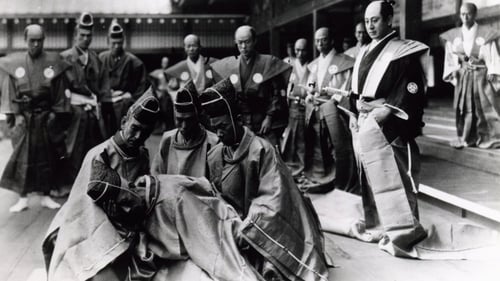
A story about Ômura Masujirô

Tsushimamori Inagaki
18세기 초, 막부정치가 안정되고, 산업이 발달해 도시가 성장하던 겐로쿠 시대. 쇼군의 명령에 따라 에도에 머물던 아코의 영주 아사노가 고관 기라와 대립해 싸움을 벌이고 만다. 평화의 시대, 성에서는 칼을 뽑지 못하게 한 법도를 어긴 아사노에게 할복하라는 명령이 떨어진다. 오오이시를 비롯한 아사노의 부하들은 주군을 잃고 절망에 빠진다.

A 1941 Japanese film directed by Shinzo Yoshida.

Final installment of the Okochi / Arai / Yamanaka Mito Komon series and just as good as the others (a good deal longer, as well). Again, this film like the other two is similar in tone and spirit to the Yamanaka Tange Sazen film and would appeal to fans of that film.

Japanese historical film.

Adaptation of the novel by Osaragi Jirō. Again scripted by the legendary Yamanaka Sadao

Yaji and Kita: The Battle of Toba Fushimi is a 1928 Japanese film directed by Tomiyasu Ikeda.[1] This comedy film showcases the acting talent of Denjirō Ōkōchi and acts as a complementary film to Yaji and Kita: Yasuda's Rescue, which is part of the Yaji and Kita series. An 8-minute remnant of the film was released on DVD by Digital Meme with a benshi accompaniment by Midori Sawato. The version in the National Film Center is 23 minutes long.

Gitaro Matsuda
Yaji and Kita: Yasuda's Rescue is a 1927 black and white Japanese silent film directed by Tomiyasu Ikeda.[1] This comedy film showcases the comic talent of Denjiro Okochi, which contrasts markedly with his heroic performance in Oatsurae Jirokichi Koshi. The humorous exchanges with Goro Kawabe, his senior at Nikkatsu, can be priceless, with the expressions and movements of the two goofy characters making for pure, hilarious slapstick comedy. A 15-minute remnant of the film was released on DVD by Digital Meme with benshi accompaniment by Midori Sawato and Ryubi Kato.

Sukesaburô

Tsugio Iki
Set in the Edo period, the film deals with two brothers falling in love with the same girl. Sadly, only 12 minutes of footage survive.



